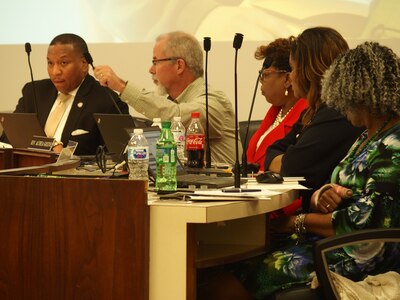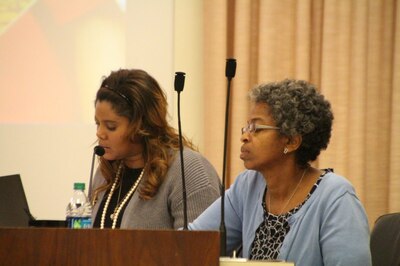The Shelby County Schools board met for the first time this year to discuss strategy and create goals to work with their new superintendent.
Their priorities to improve literacy, create a better district culture, craft clearer expectations for the superintendent, and flesh out a plan for Memphis school buildings and programs this school year were meant to correspond with Superintendent Joris Ray’s goals he laid out as interim leader. Board members appointed him as the permanent leader in April and approved his contract for a $285,000 annual salary last month.
Board members meet annually with the superintendent and his top leadership team to discuss the district’s goals. This year’s meeting was hosted by the Urban Child Institute earlier this month.
Literacy: Preparing students to read on grade level has been a longtime challenge for Memphis schools. The percentage of Shelby County Schools elementary students considered proficient in reading rose by 3 percentage points on the state’s annual test last year — but only a quarter of those students read on grade level.

The district is adding teacher assistants in second grade and implementing a phonics curriculum this year to ramp up a plan to hold back students in second grade if they don’t meet certain reading benchmarks in the 2021-22 school year.
“We can solve all this right now if we put the funds into kindergarten, first grade, and second grade,” said board member Billy Orgel. “I think the community is ready for that because all we’re doing [now] is Band-Aid stuff and passing people along.”
But the district shouldn’t over-emphasize early grades, said Shante Avant, the school board’s chairwoman.
“I don’t want us to neglect middle school and high school students who are not reading on grade level who have to go out and get a job,” she said.
Culture: Avant described district culture as “how we have expectations for our students and from the superintendent to the staff that all of our kids are treated with dignity and respect.”

Ray has instituted more staff training to respond to childhood trauma, which one national health group estimates affects 37% of students in Shelby County. But culture also includes how staff feel about working in the district, said board member Scott McCormick.
“We’ve got to get the culture right,” he said. “One complaint is like dropping a rock in still water and the waves just go out and out and out… and pretty soon you have a bad reputation. And we don’t have a good reputation in the system as a whole.”
The district plans to release a new staff survey this fall and launch more employee appreciation programs. Results of a community and parent survey are expected next month.
Accountability: The school board has been working to update its evaluation tool for the superintendent for several months. Avant said she expects that to be done this fall.
“Accountability is how we make sure that the things that people are supposed to do, they’re actually doing it,” she told Chalkbeat after the meeting.
Board member Kevin Woods said the board should also create policy requiring pay increases for central office staff be connected to the district’s academic goals rather than simply getting raises when teachers do.
“It should be based on performance metrics,” Woods told the superintendent. “What expectations we set for you should drill down to your team and we shouldn’t be reading about pay increases or promotions unless those individuals have done something to merit those rewards.”
Related: Here’s who Joris Ray is leaning on to lead Memphis schools — and how much they are paid
“Reimagining 901” plan: The possibility of more school closures has been looming ever since December when former superintendent Dorsey Hopson proposed consolidating 28 old school buildings into 10 new ones. The district has closed more than two dozen schools in recent years as enrollment decreased and finances were tight. Altogether, the district has almost $500 million in maintenance needs, which has caused some schools to temporarily close for air conditioning or heater breakdowns.

Still, Woods said Shelby County Schools has to make the plan “much bigger than school closures.”
That includes conversations about where to place more job training courses and “optional schools,” which have specialty programs that have academic requirements for admissions.
“We find that too many times that our children have to go outside of their zone to get what they need,” said board member Joyce Dorse-Coleman. “All our schools should be optional schools. There should be something at all schools.”
Ray has vowed to seek more community input on what academic programs neighborhoods want in their schools.

